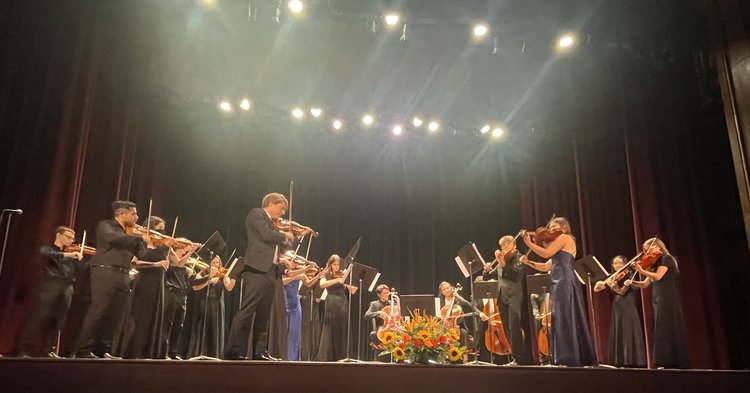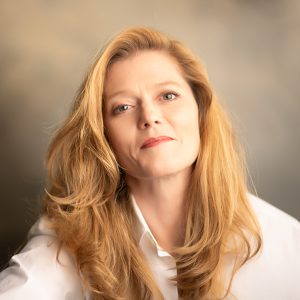Project Chamber Music: Willamette Valley brings Oregon students shoulder to shoulder with world class classical musicians

Caitlin Lynch knew she was lucky. Growing up in Salem in the 1990s, the aspiring young musician was able to take advantage of the extraordinary musical educational opportunities offered in the Salem-Keizer public schools. Its in-depth classical music instruction allowed a high school orchestra to play such sophisticated fare as the Adagietto from Gustav Mahler’s fifth symphony, often played as a standalone concert piece by professional orchestras. Her late former orchestra director Richard Bauer, who taught Lynch at McKinley Elementary, Leslie Middle School, and South Salem High, had, she remembers, “this magical way of bringing out the best in all of us.” And her private viola teacher, long-time Oregon Symphony assistant principal violist (and sometime ArtsWatch contributor) Charles Noble, “made a world of difference in my life and musical journey.” She also played viola in the Portland Youth Philharmonic.

Amplifying her own sterling musical skills, Lynch’s Oregon music education propelled her to New York’s renowned Juilliard School and eventually to her current performing career, which includes a Grammy Award, performances in more than a dozen countries and major venues such as Carnegie Hall, and violist positions in Boston’s acclaimed chamber orchestra A Far Cry, and the New York-based Aeolus String Quartet. She has also taught at various music institutions in New York City.
THE ART OF LEARNING: An Occasional Series
The farther she ventured from Oregon, the more Lynch appreciated her childhood good fortune here. “It wasn’t until I moved away and was working a lot with young musicians, and became a mother of two public school children myself, that I realized how extraordinary it is there,” she says. “The arts there are embraced. It’s a huge music program with a tradition of lot of community pride in the music making. The students do really well at the state championships.”
Unlike some traditional classical training that prioritizes technical virtuosity over emotional expression, student enjoyment, and personal connection to music, churning out a few coldly robotic prodigies while neglecting the rest, Lynch’s education “was never just about [achieving] perfection,” she explains. “It was available to all of us. The sum is greater than the parts. We felt embraced and loved by a strong musical community. That has shaped how I am and my approach to music making. All of those experiences — jazz choir, choir, band, string, and symphony orchestras — have stuck in my heart.”
So she decided to return the favor. In 2015, Lynch, now based in Boston, launched Project Chamber Music: Willamette Valley (PCM) “as a way to give back to the musical community that raised me.”
The program sponsors annual visits to Salem-Keizer’s public middle and high school orchestras by Lynch’s own Aeolus colleagues and other musician friends and colleagues she’s worked with in music festivals, school, or other projects around the country. During the three-day residency, PCM musicians perform in student classrooms, participate in workshops with their orchestras, answer questions from the students about life as performing musicians, and offer public rehearsals that offer students a peek at the process behind the stage superlatives. They also work with students to prepare for a culminating collaborative concert that includes students from all the orchestras and the PCM artists. Each year, the organization donates all proceeds from that concert to the Salem-Keizer public school orchestra programs.
On Sunday, December 3, Willamette University’s Hudson Concert Hall hosts PCM’s annual concert, featuring illustrious pianist Stewart Goodyear, Lynch’s award-winning Aeolus Quartet, and her childhood viola teacher, Charles Noble.

Collaboration, not Competition
Lynch knew that “the Salem public school system music system has got it going on,” she says. “They have great teachers who do great work. We wanted to supplement what the students were already experiencing.”
She prioritized one principle in particular. “When I was growing up, one thing I wished for was to have a non-competitive environment for making music,” Lynch remembers. “We didn’t really see other orchestras. I wanted them to build a citywide, district-wide arts string community where students found companionship together by getting to know each other in a non-competitive environment. All too frequently, the classical music world is about competition or comparison to others, and I truly deep in my heart believe that there’s space for everyone’s voice, and only good can come from all of us building each other up.”
Lynch called on an old ally to help her put her vision into action. Mary Lou Boderman, who’d been her high school band director, was now coordinator of music and drama for the district. “She contacted me and said she had this fledgling idea,” Boderman recalls. “She had her objectives, wanting to give back to the community and also giving back by being able to bring world-class musicians into Salem. She asked, ‘Is there also a way we can work with students while we’re here? What would help the most?’”
Boderman told her that “the lack of equity access to private lessons” was preventing too many students whose families couldn’t afford them from having a fair shot at developing musicianship. “Any student who wanted to be able to take private lessons should be able to,” Boderman says. So far, PCM concert proceeds have raised $25,000 to fund private lessons for district students who otherwise couldn’t afford them.

Together, Lynch and Boderman constructed a process in which the guest musicians would work with students from several middle and high school orchestras, rotating among the district’s schools so that, over the first few years, all students would have access to the program. On the visits, the professionals present workshops that can cover topics from string instrument bowing techniques to stage fright. And they perform a movement from a work they would be playing in concert, and then the students would return the favor. Questions and answers would ensue. Much more than just one-way, top down teaching, “we play for students and hear them play and work with them,” Lynch says. ”It’s truly an exchange.”
Lynch works with the teachers to put together a district-wide string orchestra that everyone would start practicing in class before the guest artists arrived. Two students from each high school would play with the quartet during the final concert.
“It’s a different experience to share the stage [with professionals] and experience the intensity and energy of a performance,” Lynch says. And just as important, “We’re going through the preparation process with the students, sharing the process of building a performance together, building the kinetic energy you need for a strong live performance.”
Sharing music stands and scores, working shoulder to shoulder with the pros, distinguishes PCM from the usual visiting master classes offered by touring classical ensembles. “Having that contact allows [students] to see these how these [professionals] approach their practicing and music-making in the same way they do, just at higher levels,” explains Boderman, who’s since retired from her district position. “They’re able to build relationships and ask questions.”

Having students from rival schools cooperate rather than compete (as in the usual tournament-oriented set-up common in most districts, found in everything from athletics to forensics), advances Lynch’s insistence on fostering a non-competitive educational environment. And working with the professionals shows the essentially collaborative nature of actual chamber and orchestral music-making, which in turn underlines for students the importance of empathetic listening, clear communication, compromise in the pursuit of shared objectives, and other facets of effective teamwork.
The program is entirely grant funded by individuals and corporations, Lynch says.
Unique Inspiration
PCM’s secret sauce is how it fosters real interactions between students and professional musicians.
“There’s almost always a gap in public education between what is needed and what is provided, and programs like Project Chamber Music are vital ways to bring the needed into the classroom,” says Noble. “The inspiration that seeing world-class artists up close and personal provides is real and there are no substitutions for it.”
Lynch believes that close contact makes all the difference. “A teacher told me once that one of the best ways to help a student is to play for them. Because then they have the sound [they want to achieve] in their ear. You’re also building trust, not just coming in and telling them what to do.”
Boderman thinks PCM works so well “primarily because it’s so personal. [The professionals] are all really good at interacting with students. There’s not [an orchestra] pit to divide them. They’re right there, sitting with them, playing with them, asking questions — lots of interaction. When they introduce the pieces they’re playing, they speak to emotion, not just technical skills. You have to develop the technique, but it’s only a means to an end — to express your inner feelings to people. It’s an art. It’s inspiring them at that level, too. A lot of dreams are made in that kind of interaction. It puts a real face to being a professional musician.”
It certainly helps that one of those faces belongs to an accomplished professional who grew up in the same area the students did, attended the same public schools, had some of the same dreams — and achieved them. What might have seemed entirely unthinkable for many of the students now looks within reach.

“Salem-Keizer is probably the most diverse district in the state,” Boderman says. “Some of our Title 1 kids are financially challenged and from different cultural backgrounds. I remember at one of the Q&As, a student asked who [the visiting artists] have enjoyed playing with, and one of them mentioned Yo Yo Ma, and their eyes got really big. To have interaction with these folks who have done so much — for some of these middle school kids, they hear ‘if this is something you aspire to, and you can sustain the hard work it takes, it’s possible.’ They think, ‘This is something I could do, too.’”
Another reason for the program’s success: its founder.
“Caitlin has always been an amazingly positive person,” her mentor Charles Noble recalls. “She approached her music-making with that positivity, and has always had a way of communicating joy through her playing. She is an incredibly hard worker with a focus on community service. So it makes a lot of sense that she’d dedicate a portion of her musical life to giving back to her community and the next generations of young musicians.“
“She’s a charmer,” says Boderman about Lynch, “and she has such a heart for education.”
Lasting Impact
After seven years, the program has won support and praise from district teachers and officials.
“Caitlin’s program is a great example of giving back to a community, and we are extremely grateful for the amazing gifts and talents she shares with our orchestra programs,” wrote Boderman’s successor, Stephen Lytle, in an email. “Her annual visit assists our teachers and students in three ways. First, their school residencies allow our students to hear and see, firsthand, incredible models of performance quality, as well as learn more about how musicians work and communicate with one another to create a performance.

“Second, our top high school students have the opportunity to work with the quartet in a joint performance of a large work and this is performed as a large ensemble, unconducted — the students are pushed to really listen and communicate in ways that can be new to them. This is a rare opportunity that is a unique feature to this residency.
“Lastly, the funds raised are for the support of private instruction, which is the most effective means of advancing individual student growth, and critical for those who would seek to follow in Caitlin’s footsteps.”
Boderman says she’s seen the program’s impact on students who’ve gone on to major college music programs. “For those kids considering music as a career, you learn that you don’t just go in and audition for a symphony and get there. You have to do a lot of things to be a professional musician. [PCM provides] a nice opportunity for those kids to get some information to make life-changing decisions.”
With this year’s residency coinciding with the district’s announcement of impending layoffs and other cutbacks, its supplementary financial and educational value become even clearer.
Amid so much turmoil in Oregon education, PCM’s success puts a spotlight on the district’s musical education success, and allows Lynch to visit her Pacific Northwest home grounds and the family and friends here she still cherishes. And this year is a special treat because she gets to share it with her former teacher, Charles Noble. “I truly could not be where I am today without him,” Lynch says. “His impact on me still reverberates, and the fact that we get to perform side-by-side this weekend is so incredibly special. I can’t wait to share the stage with him on Sunday — it will be the first time we’ve ever played together in my adult life, and I couldn’t be more excited!”
The biggest impact, though, will as always be on the impressionable young musicians on stage and in the audience. “I remember vividly my first time hearing a string quartet when I was young, when Chamber Music Northwest brought the Tokyo Quartet to town,” Lynch says. “It was such an impactful experience for me to witness that concert. When I’m rehearsing and performing with students, I see them excited and lighting up with the collaboration and energy and music-making. We’re creating opportunities for those kinds of lightbulb experiences. It’s such a privilege to be able to work with and expose the students to someone like Stewart [Goodyear] and bring them to the Willamette Valley to share their artistry with the community. It’s my way of saying thank you. I believe deeply that those experiences and encounters with music should be available to every kid. That is why we remove the barrier of cost, and why I delight every year in curating a program that I hope will inspire and delight them in return.”
Project Chamber Music: Willamette Valley’s annual concert happens at 4 pm on Sunday, December 3 at Willamette University’s Hudson Concert Hall. Acclaimed pianist Stewart Goodyear will perform alongside the award-winning Aeolus Quartet, as well as special guest Charles Noble, assistant principal violist with the Oregon Symphony. The program includes Andrea Casarrubios: Overture & Chorale, Mozart’s sublime Viola Quintet in G minor, k. 516, and Brahms’s Piano Quintet in F minor, op. 34. For tickets and further information, visit here.







